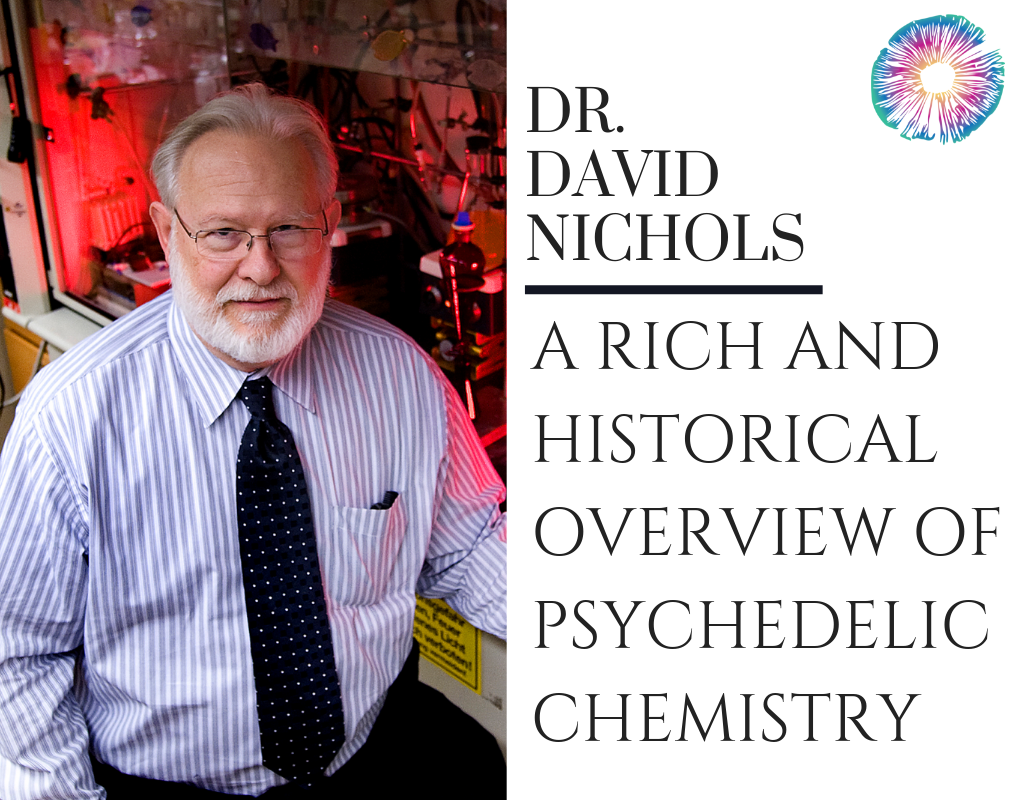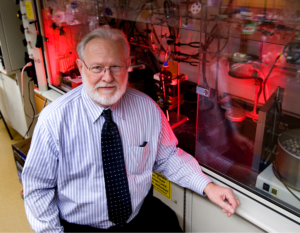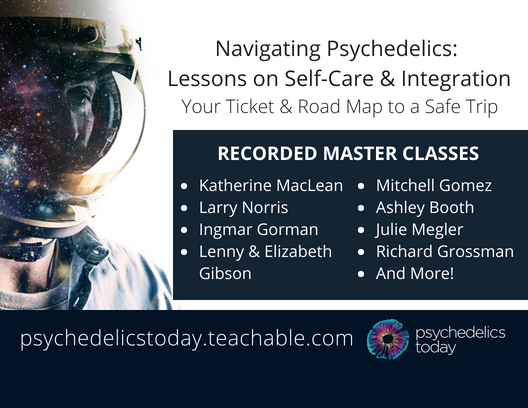
Research
Dr. David Nichols – A Rich and Historical Overview of Psychedelic Chemistry
August 6, 2019
Download
In this episode, Joe interviews Dr. David Nichols, American Pharmacologist and Chemist. Dr. Nichols has made many contributions to the psychedelic space and is recognized as one of the foremost experts for his outstanding efforts in medicinal chemistry of hallucinogens.

Download
In this episode, Joe interviews Dr. David Nichols, American Pharmacologist and Chemist. Dr. Nichols has made many contributions to the psychedelic space and is recognized as one of the foremost experts for his outstanding efforts in medicinal chemistry of hallucinogens.
3 Key Points:
- Dr. David Nichols is the founder of The Heffter Research Institute, which promotes research of the highest scientific quality with the classic hallucinogens and psychedelics in order to contribute to a greater understanding of the mind leading to the improvement of the human condition, and to alleviate suffering.
- Dr. Nichols has a strong opposition toward the DMT/pineal gland theory. The assumption is that DMT is released during birth and death, but Dr. Nichols presents opposing arguments as to why it isn’t true.
- David doesn’t believe in the research of microdosing psychedelics. He believes there are many other diseases and disorders that research money could be put toward discovering drugs for than the potential for heightened creativity with microdosing.
Support the show
- Patreon
- Leave us a review on iTunes
- Share us with your friends – favorite podcast, etc
- Join our Facebook group – Psychedelics Today group – Find the others and create community.
Navigating Psychedelics
Trip Journal Integration Workbook


Show Notes
About David
- When he was a kid he was into pyrotechnics
- He synthesized a lot of MDMA for MAPS
- He is the founding President of Heffter Research Institute
- He was introduced to psychedelics before he went to graduate school
- David’s work was never interrupted during the drug war because he wasn’t doing any clinical work
- He proposed the study for MDMA testing on rats for a micro-dialysis of chemicals being released from the brain
David’s History of Substances
- David attended a meeting at the Esalon Institute
- He met Rick Doblin, a young kid at the time, who was enthusiastic about MDMA and Marijuana
- Rick decided he wanted to develop MDMA as a drug, and asked David to make it with him
- Then David met Rick Strassman, who asked him to make DMT
- So he made the DMT and then DMT Spirit Molecule came out as a result
- David made the first batch of psilocybin for John Hopkins
- “The only way to use these substances, is to use the medical model.” – David
Microdosing
- David doesn’t agree with microdosing, he thinks its all just a big hype
- He says that there is a huge placebo effect with microdosing
- He says there isn’t a lot of proven results and literature to make him believe in it
- He thinks that there are far too many other things to research and create drugs to cure (like eating disorders for example) vs. just heightening creativity with microdosing
- David edited Torsten Passie’s book, The Science of Microdosing Psychedelics
DMT
- Rick Strassman’s DMT hypothesis is that upon birth and death, the Pineal gland produces DMT, which produces an outer-body experience
- David says that the pineal gland is too small, it’s only 180mg
- It produces 25 micrograms of melatonin in 24 hours, so there is no way for it to produce 25 milligrams of DMT, the amount needed for a DMT trip
Heffter Origins
- Heffter Research Institute was David’s idea
- Arthur Heffter was a scientist with a PhD in Pharmacology and Chemistry
- He was one of the most well respected Scientists in Germany
- He got samples of Peyote, and knew there were alkaloids in it, and he separated all the alkaloids, and took each alkaloid himself to find out that mescaline was the active component in Peyote
- He was the expert who invented hair tests to find out if people were suffering from lead poisoning
Heffter Research Institute
- The effects that they discovered from Psilocybin blew them away
- They knew LSD had powerful effects, but they weren’t expecting to find the therapeutic benefits that they did with Psilocybin
- Psilocybin has a great timeline too, LSD is really long lasting, and 5-MEO-DMT is super short and really powerful
- Psilocybin is great for use in therapy because of the time it allows for integration
GMP Psilocybin Patent
- Joe mentions the patent of GMP Psilocybin and asks if there are other ways to make psilocybin
- David says that he believes there are other ways to make Psilocybin
- The cost of psilocybin is trivial in comparison to the cost of therapy, David doesn’t think that the drug itself will have a monopoly
Links
About Dr. David Nichols

Dr. Nichols originally conceived of a privately funded Institute as the most effective mechanism for bringing research on psychedelic agents into the modern era of neuroscience. This vision led to the founding of the Heffter Research Institute in 1993. He is currently an Adjunct Professor at the University of North Carolina Chapel Hill, NC, where he continues his research. The focus of his graduate training, beginning in 1969, and of much of his research subsequent to receiving his doctorate in 1973 has been the investigation of the relationship between molecular structure and the action of psychedelic agents and other substances that modify behavioral states. His research has been continuously funded by government agencies for more three decades. He consults for the pharmaceutical industry and has served on numerous committees and government research review groups. Widely published in the scientific literature and internationally recognized for his research on centrally active drugs, he has studied all of the major classes of psychedelic agents, including LSD and other lysergic acid derivatives, psilocybin and the tryptamines, and phenethylamines related to mescaline. Among scientists, he is recognized as one of the foremost experts on the medicinal chemistry of hallucinogens. His high standards and more than four decades of research experience set the tone to ensure that rigorous methods and quality science are pursued by the Institute.



